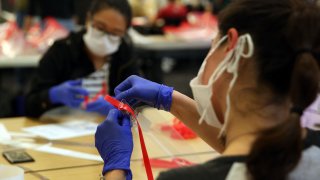
What to Know
- 21,750 black people have died of COVID-19 complications.
- Black people make up 13% of the U.S. population, and yet they account for 24% of deaths where race is known.
- COVID-19 has served to further expose this gap in access and care, prompting the researchers to provide more public data.
Calling racism a public health crisis, the UCLA Center for Health Policy Research Thursday released detailed data on COVID-19 case and death rates by race and ethnicity to underline the fact that black people are dying of the virus at an alarmingly high rate.
"As of yesterday, we've lost at least 21,750 black lives to COVID-19 in the United States. While black people make up 13% of the U.S. population, they account for 24% of deaths where race is known,'' said Ninez Ponce, the center's director.
Systemic, structural and institutionalized racism has created barriers to health and opportunity for communities of color and race has long been a factor when conducting health research, Ponce said. COVID-19 has served to further expose this gap in access and care, prompting the researchers to provide more public data.
"Black Lives Matter. We need to say it. And we need to mean it. Whether we're marching alongside our black friends, colleagues, and students, donating to organizations that help the fight against racism, listening, learning and advocating, we must step up for the black community right now,'' the center's director said.
UCLA researchers hope that the data dashboard, available at healthpolicy.ucla.edu, will help policymakers, journalists, advocates and other researchers conduct their own analyses of the impact of the disease on various communities and what can be done to eradicate differences in health outcomes.
Local
Get Los Angeles's latest local news on crime, entertainment, weather, schools, COVID, cost of living and more. Here's your go-to source for today's LA news.
The dashboard breaks down data by county using those cases for which information on race and ethnicity was logged. The current data set represents roughly 80% of total reported cases.
In Los Angeles County, despite higher rates of infection among Latino residents, blacks are more likely to die of COVID-19 than their Latino neighbors, who have an even lower rate of fatalities than white Angelenos. The rate of death per 100,000 people is 34, 26, 24 and 18 for black, Asian, white and Latino residents, respectively, according to the UCLA dashboard.
Ponce highlighted health disparities specific to black residents in California, more than one in five of whom have asthma, while nearly 45% have been diagnosed with high blood pressure at some point. The incidence of diabetes is nearly twice that of white residents, at 16.8% for black Californians.
While the trends across race and ethnicity are largely the same, the disparities between white and black residents are more even more pronounced statewide.
Native Hawaiians and Pacific Islanders are dramatic outliers in both the rate of cases and deaths, with nearly six times as many confirmed cases as white residents and three and a half times the death rate.
A comparison of statewide and Los Angeles County results -- looking only at the cases for which information on race and ethnicity is available -- also indicates that county residents are in general dying at a higher rate, which some public health authorities have attributed to higher density living in the Southland.
In Los Angeles County, black residents test positive for COVID-19 at a 15% higher rate per 100,000 people than whites. That stands in contrast to Latino residents, who test positive for the infection at a rate nearly 58% higher than white Angelenos -- a gap that is much larger than the statewide trend. These totals may reflect variances in access to testing as well as susceptibility to the infection.
The UCLA group also conducts the annual California Health Interview Survey and has added questions about the impact of the COVID-19 pandemic.
Researchers said that, for the first time ever, they plan to release some preliminary results to get critical information out early to those who can take action.
"We stand in unity with all organizations and individuals dedicating themselves to overcoming systemic issues that block opportunities and harm the well-being of all our California communities and beyond. We need to continue to work together and do better,'' Ponce said.



